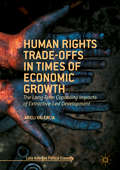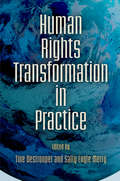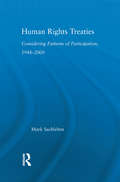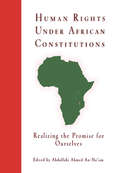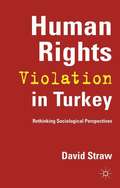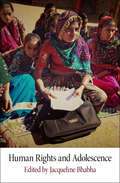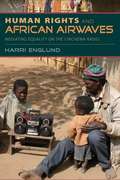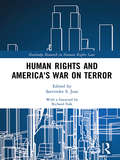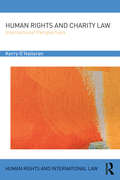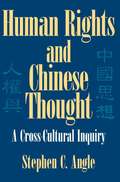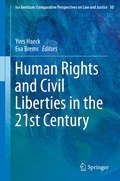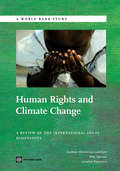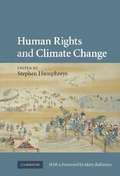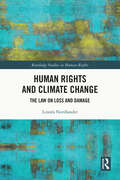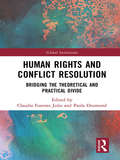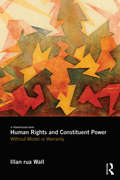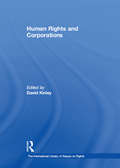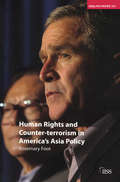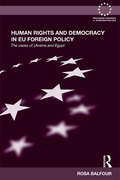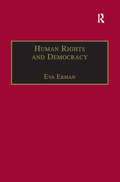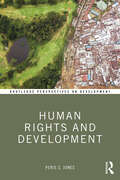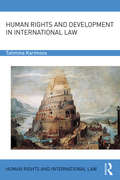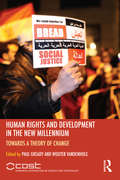- Table View
- List View
Human Rights Trade-Offs in Times of Economic Growth: The Long-Term Capability Impacts of Extractive-Led Development (Latin American Political Economy)
by Areli ValenciaThis book uncovers a historical dependency on smelting activities that has trapped inhabitants of La Oroya, Peru, in a context of systemic lack of freedom. La Oroya has been named one of the most polluted places on the planet by the US Blacksmith Institute. Residents face the dilemma of whether to defend their health or to preserve job stability at the local smelter, the main source of toxic pollution in town. Valencia unpacks this paradoxical human rights trade-off. This context, shaped by social, historical, political, and economic factors, increases people’s vulnerabilities and decreases their ability to choose, resulting in residents' trading off their right to health in order to work. This book shows the deep connection of this local dilemma to the country’s national paradox, arising out of Peru's vision of natural resource extraction as the main path to secure economic growth for the entire country at the expense of some groups.
Human Rights Transformation in Practice (Pennsylvania Studies in Human Rights)
by Tine Destrooper Sally MerryHuman rights are increasingly described as being in crisis. But are human rights really on the verge of disappearing? <P><P>Human Rights Transformation in Practice argues that it is certainly the case that human rights organizations in many parts of the world are under threat, but that the ideals of justice, fairness, and equality inherent in human rights remain appealing globally—and that recognizing the continuing importance and strength of human rights requires looking for them in different places. <P><P>These places are not simply the Human Rights Council or regular meetings of monitoring committees but also the offices of small NGOs and the streets of poor cities.In Human Rights Transformation in Practice, editors Tine Destrooper and Sally Engle Merry collect various approaches to the questions of how human rights travel and how they are transformed, offering a corrective to those perspectives locating human rights only in formal institutions and laws. <P><P>Contributors to the volume empirically examine several hypotheses about the factors that impact the vernacularization and localization of human rights: how human rights ideals become formalized in local legal systems, sometimes become customary norms, and, at other times, fail to take hold. Case studies explore the ways in which local struggles may inspire the further development of human rights norms at the transnational level. <P><P>Through these analyses, the essays in Human Rights Transformation in Practice consider how the vernacularization and localization processes may be shaped by different causes of human rights violations, the perceived nature of violations, and the existence of networks and formal avenues for information-sharing. <P><P>Contributors: Sara L. M. Davis, Ellen Desmet, Tine Destrooper, Mark Goodale, Ken MacLean, Samuel Martínez, Sally Engle Merry, Charmain Mohamed, Vasuki Nesiah, Arne Vandenbogaerde, Wouter Vandenhole, Johannes M. Waldmüller.
Human Rights Treaties: Considering Patterns of Participation, 1948-2000 (Studies in International Relations)
by Mark SachlebenThe book examines patterns of participation in human rights treaties. International relations theory is divided on what motivates states to participate in treaties, specifically human rights treaties. Instead of examining the specific motivations, this dissertation examines patterns of participation. In doing so, it attempts to match theoretical expectations of state behavior with participation. This book provides significant evidence that there are multiple motivations that lead states to participate in human rights treaties.
Human Rights Under African Constitutions
by Abdullahi Ahmed An-Na'imSome of the most massive and persistent violations of human rights occur in African nations. In Human Rights Under African Constitutions: Realizing the Promise for Ourselves, scholars from a wide range of fields present a sober, systematic assessment of the prospects for legal protection of human rights in Africa. In a series of detailed and highly contextual studies of Ethiopia, Ghana, Guinea, Morocco, Mozambique, Nigeria, Rwanda, Senegal, South Africa, Sudan, and Uganda, experts seek to balance the socioeconomic and political diversity of these nations while using the same theoretical framework of legal analysis for each case study.Standards for human rights protection can be realized only through direct and strong support from a nation's legal and political institutions. The contributors to this volume uniformly conclude that a well-informed and motivated citizenry is the most powerful force for creating the political will necessary to effect change at the national level. In addition to a critical evaluation of the current state of human rights protection in each of these African nations, the contributors outline existing national resources available for protecting human rights and provide recommendations for more effective and practical use of these resources.
Human Rights Violation in Turkey
by David StrawSociological theory has veered between an insistence on understanding human rights as a genuine universal morality and far more cynical portrayals of human rights as a veil of bourgeois capitalist enterprise. This book criticizes, adapts and combines seemingly disparate elements of contemporary sociological theory within a new approach to human rights. The practicality of the approach is clearly demonstrated in its application to one of the most important, complex and vexing locations of human rights violation in the world: modern Turkey. While sociological analyses of Turkey have largely been limited to local perspectives on individual issues of human rights violation, this book expands sociological understanding of the broad swath of Turkey's human rights violations into a new global perspective of hope and resolution.
Human Rights Watch World Report 2005
by Human Rights WatchThis report is Human Rights Watch's fifteenth annual review of human rights practices around the globe. It summarizes key human rights issues in sixty-four countries, drawing on events through November 2004. Each country entry identifies significant human rights issues, examines the freedom of local human rights defenders to conduct their work, and surveys the response of key international actors, such as the United Nations, European Union, Japan, the United States, and various regional and international organizations and institutions. The volume begins with four essays addressing human rights developments of global concern in 2004. The lead essay examines far-reaching threats to human rights that emerged during the year: large-scale ethnic cleansing in Darfur in western Sudan, and detainee abuse at Abu Ghraib prison in Iraq, symptomatic of a broader problem of torture and mistreatment of detainees by U.S. forces. It argues that the vitality of human rights defense worldwide depends on a firm response to both of these threats.
Human Rights and Adolescence (Pennsylvania Studies in Human Rights)
by Jacqueline BhabhaWhile young children's rights have received considerable attention and have accordingly advanced over the past two decades, the rights of adolescents have been neglected. This manifests itself in pervasive gender-based violence, widespread youth disaffection and unemployment, concerning levels of self-abuse, violence and antisocial engagement, and serious mental and physical health deficits. The cost of inaction on these issues is likely to be dramatic in terms of human suffering, lost social and economic opportunities, and threats to global peace and security. Across the range of disciplines that make up contemporary human rights, from law and social advocacy to global health, history, economics, sociology, politics, and psychology, it is time, the contributors of this volume contend, for adolescent rights to occupy a coherent place of their own.Human Rights and Adolescence presents a multifaceted inquiry into the global circumstances of adolescents, focusing on the human rights challenges and socioeconomic obstacles young adults face. Contributors use new research to advance feasible solutions and timely recommendations for a wide range of issues spanning all continents, from relevant international legal norms to neuropsychological adolescent brain development, gender discrimination in Indian education to Colombian child soldier recruitment, stigmatization of Roma youth in Europe to economic disempowerment of Middle Eastern and South African adolescents. Taken together, the research emphasizes the importance of dedicated attention to adolescence as a distinctive and critical phase of development between childhood and adulthood and outlines the task of building on the potential of adolescents while providing support for the challenges they experience.Contributors: Theresa S. Betancourt, Jacqueline Bhabha, Krishna Bose, Neera Burra, Malcolm Bush, Jocelyn DeJong, Elizabeth Gibbons, Katrina Hann, Mary Kawar, Orla Kelly, David Mark, Margareta Matache, Clea McNeely, Glaudine Mtshali, Katie Naeve, Elizabeth A. Newnham, Victor Pineda, Irene Rizzini, Elena Rozzi, Christian Salazar Volkmann, Shantha Sinha, Laurence Steinberg, Kerry Thompson, Jean Zermatten, Moses Zombo.
Human Rights and African Airwaves: Mediating Equality on the Chichewa Radio
by Harri EnglundHuman Rights and African Airwaves focuses on Nkhani Zam'maboma, a popular Chichewa news bulletin broadcast on Malawi's public radio. The program often takes authorities to task and questions much of the human rights rhetoric that comes from international organizations. Highlighting obligation and mutual dependence, the program expresses, in popular idioms and local narrative forms, grievances and injustices that are closest to Malawi's impoverished public. Harri Englund reveals broadcasters' everyday struggles with state-sponsored biases and a listening public with strong views and a critical ear. This fresh look at African-language media shows how Africans effectively confront inequality, exploitation, and poverty.
Human Rights and Agents of Change in Iran: Towards a Theory of Change (Studies in Iranian Politics)
by Shahram Akbarzadeh Rebecca BarlowThis volume extends debates on the interaction between universal human rights and the political experiences of Iranians, through a conceptual analysis of ‘theories of change’. It assesses the practical processes by which individuals, organizations and movements can reform or impact the structural, theological and political challenges faced in the Iranian context.Contributors to this volume investigate how structures, institutions, and agents in Iran maneuver for influence and power at the state level, through the law, in international corridors, at the grassroots, and by implementing multiple and complex methods. The chapters provide distinct but interrelated analysis of key drivers of change in Iran. A number of those operate primarily through top-down approaches, such as the political reform movement, lawyers pursuing legislative change, and international human rights monitoring bodies. Others take a bottom-up approach, including local movements and campaigns such as the women’s movement, the labor movement, the student movement, and ethnic minority groups.By prompting drivers of change to think about causation, influence, sequencing, prioritization, roles and relationships, a theory of change ultimately makes the work more effective. Through rigorous analysis of these issues for drivers of change in the Islamic State, this volume is an important contribution to human rights in Iran. In an era of escalating tensions in the Middle East, it amplifies voices of reform and freedom, filling a crucial gap in our understanding of this region.
Human Rights and America's War on Terror (Routledge Research in Human Rights Law)
by Satvinder S. JussThis volume examines the success of the 9/11 attacks in undermining the cherished principles of Western democracy, free speech and tolerance, which were central to US values. It is argued that this has led to the USA fighting disastrous wars in Afghanistan and Iraq, and to sanctioning the use of torture and imprisonment without trial in Guantánamo Bay, extraordinary rendition, surveillance and drone attacks. At home, it has resulted in restrictions of civil liberties and the growth of an ill-affordable military and security apparatus. In this collection the authors note the irony that the shocking destruction of the World Trade Center on 9/11 should become the justification for the relentless expansion of security agencies. Yet, this is a salutary illustration of how the security agencies in the USA have adopted faulty preconceptions, which have become too embedded within the institution to be abandoned without loss of credibility and prestige. The book presents a timely assessment of both the human rights costs of the ‘war on terror’ and the methods used to wage and relentlessly continue that war. It will be of interest to researchers, academics, practitioners and students in the fields of human rights law, criminal justice, criminology, politics and international studies.
Human Rights and Charity Law: International Perspectives (Human Rights and International Law #36)
by Kerry O'HalloranThe 60 or so nations that subscribe to the common law tradition had for centuries broadly accepted the same legal definitions of what constitutes a charity. In recent years, however, a number of countries have embarked on charity law reform processes, designed to strengthen the regulatory framework and to review and encode common law concepts. A primary driver of reform was the need to modernise national charity law and ensure human rights compatibility. In light of these reforms, this book takes stock of how charity law is adapting to face the challenges presented by human rights. The book identifies the key areas where human rights and charity law intersect and examines the importance of those areas, the principles involved and their political significance. It offers a comparative analysis of selected common law countries including England, Wales, Ireland, US, Canada, Australia and New Zealand, assessing the extent of national human rights and charity compatibility. Kerry O’Halloran also goes on to consider tensions arising from the intersection of human rights and charity law, including the significance of cultural values and heritage, the importance of proportionality and striking a balance between public and private interests in current society.
Human Rights and Chinese Thought: A Cross-Cultural Inquiry
by Stephen C. AngleWhat should we make of claims by members of other groups who have moralities different from our own? Human Rights in Chinese Thought gives an extended answer to this question in the first study of its kind. It integrates a full account of the development of Chinese rights discourse with philosophical consideration of how various communities should respond to contemporary Chinese claims about the uniqueness of their human rights concepts. The book elaborates a plausible kind of moral pluralism and demonstrates that Chinese ideas of human rights do indeed have distinctive characteristics, but it nonetheless argues for the importance and promise of cross-cultural moral engagement.
Human Rights and Civil Liberties in the 21st Century
by Eva Brems Yves HaeckThis volume contributes to the on-going legal discussion on pressing procedural and substantial law issues in the ambit of international human rights and civil liberties. While the 20th century has seen the true awakening of human rights, the 21st century poses new challenges to this ever-unfolding area of law. Not only do international tribunals and quasi-tribunals worldwide and domestic US and European continental courts have to deal with increasing numbers of complaints and petitions from individuals and groups on a vast array of societal problems, the legal issues put to them are sometimes extremely difficult to resolve as they relate to very sensitive issues. This book examines issues ranging from the status of human rights under US law to the status of the ECHR in the broader context of international law. It looks at the role of positive obligations in the case law of the Strasbourg Court, as well the impact of its case-law on childbirth and push-back operation towards boat people, but also at the growing unwillingness of ECHR member states to cooperate with the Strasbourg Court. It explores the new frontiers in US Capital punishment litigation, the first case before the International Criminal Court and the legal effect of judgments of the European Court on third states.
Human Rights and Climate Change
by Siobhan Mcinerney-Lankford Mac Darrow Lavanya RajamaniThis Study explores arguments about the impact of climate change on human rights, examining the international legal frameworks governing human rights and climate change and identifying the relevant synergies and tensions between them. It considers arguments about (i) the human rights impacts of climate change at a macro level and how these impacts are spread disparately across countries; (ii) how climate change impacts human rights enjoyment within states and the equity and discrimination dimensions of those disparate impacts; and (iii) the role of international legal frameworks and mechanisms, including human rights instruments, particularly in the context of supporting developing countries' adaptation efforts. The Study surveys the interface of human rights and climate change from the perspective of public international law. It builds upon the work that has been carried out on this interface by reviewing the legal issues it raises and complementing existing analyses by providing a comprehensive legal overview of the area and a focus on obligations upon States and other actors connected with climate change. The objective has therefore been to contribute to the global debate on climate change and human rights by offering a review of the legal dimensions of this interface as well as a survey of the sources of public international law potentially relevant to climate change and human rights in order to facilitate an understanding of what is meant, in legal terms, by "human rights impacts of climate change" and help identify ways in which international law can respond to this interaction. This is a complex and dynamically evolving legal and policy landscape and this study aims to capture its most salient features insofar as they appear at present. The Study employs the following three-part conceptual understanding of the links between human rights and climate change. First, climate change may affect the enjoyment of human rights: this is explored in part II and draws from the existing work of the United Nations (UN) Office of the High Commissioner for Human Rights (OHCHR), the UN Human Rights Council and the International Council on Human Rights Policy. Second, measures to address climate change may impact the realization of human rights. This is a subset of the discussion of "impacts" targeting "secondary" human rights impacts of measures aimed at addressing climate change. Third, human rights have relevance to policy and operational responses to climate change, such that human rights obligations (both substantive and procedural) may be relevant to the design and implementation of effective responses to climate change, particularly in relation to adaptation and to some extent also to mitigation. Human rights may also have a role in promoting resilience to climate change and may reinforce sustainable development goals. The Study includes a number of approaches from connecting climate change to specific human rights impacts under international human rights law, to tracing the applicable sources of law and surveying identifiable obligations under international human rights law and international environmental law. The Study reviews how human rights law addresses environmental protection in substantive and procedural terms focusing in particular on the advances made in the latter through the jurisprudence of regional human rights bodies for example. The Study considers also how environmental protection has been extended to regulate private as well as public action. Following from this is a discussion of the application of human rights to climate change, including an outline of the various ways in which human rights can be seen to "add value" to the discourse, including the use of human rights legal framework as a tool for helping analyse climate impacts and determining appropriate policy responses. The Study includes a summary analysis of principles and precepts of international human rights law and multilateral environmental agreements (MEA) to consider their compatibility in conceptual terms. It concludes wi...
Human Rights and Climate Change
by Stephen Humphreys Mary RobinsonAs the effects of climate change continue to be felt, appreciation of its future transformational impact on numerous areas of public law and policy is set to grow. Among these, human rights concerns are particularly acute. They include forced mass migration, increased disease incidence and strain on healthcare systems, threatened food and water security, the disappearance and degradation of shelter, land, livelihoods and cultures, and the threat of conflict. This inquiry into the human rights dimensions of climate change looks beyond potential impacts to examine the questions raised by climate change policies: accountability for extraterritorial harms; constructing reliable enforcement mechanisms; assessing redistributional outcomes; and allocating burdens, benefits, rights and duties among perpetrators and victims, both public and private. The book examines a range of so-far unexplored theoretical and practical concerns that international law and other scholars and policy-framers will find increasingly difficult to ignore.
Human Rights and Climate Change: The Law on Loss and Damage (Routledge Studies in Human Rights)
by Linnéa NordlanderThis insightful and timely book examines the intersection of international climate change law and international human rights law with respect to loss and damage from climate change. Bringing together these two areas of the law, the volume reframes the debate on loss and damage law and offers the first systematic analysis of the legal consequences of Article 8 of the 2015 Paris Agreement, both independently and in light of the concurrent applicability of human rights law to climate change harms. The author outlines the legal implications of Article 8 and the extent to which the application of a human rights perspective can contribute to the interpretation and development of those implications. Accessible and engaging, this book has important implications for both legal doctrine and policy development at the international level. This book is a valuable resource for scholars, students, and practitioners in human rights, human rights law, climate change law, and international environment law.
Human Rights and Conflict Resolution: Bridging the Theoretical and Practical Divide (Global Institutions)
by Claudia Fuentes Julio Paula DrumondHuman rights and conflict resolution have been traditionally perceived as two separate fields, sometimes in competition or in tension and occasionally with contradictory approaches towards achieving a lasting peace. Although human rights norms have been incorporated and institutionalized by various national, regional, and international organizations that deal with conflict resolution, negotiators and mediators are often pressured in practice to overlook international human rights principles in favor of compliance and more immediate outcomes. The chapters in this volume navigate the relationship between human rights and conflict resolution by fleshing out practical, conceptual, and institutional encounters of the two agendas and engaging with lessons learned and windows of opportunities for mutual learning. Recognizing the increasing relevance of this debate and important gaps in the current research on the topic, this book addresses the following questions: How can we improve our practical and theoretical understanding of the complementarity between human rights and conflict resolution? How would a human rights-based approach to conflict resolution look like? How are international, regional, and national organizations promoting, implementing, and/or adapting to better coordinate between human rights and conflict resolution? Building on empirical evidence from contemporary conflict resolution processes, how have human rights been integrated in different efforts on the ground? What are the main lessons learned in this regard? Examining a wide range of countries and issues, this work is essential reading for human rights, conflict resolution, and security experts including scholars, diplomats, policy-makers, civil society representatives, and students of international politics.
Human Rights and Constituent Power: Without Model or Warranty
by Illan rua WallWith the emergence of modern human rights in the Universal Declaration, what remained of a radical political potential of the discourse withdrew: statism and individualism became its authorised foundations and the possibilities of other human rights traditions were denied. The strife that once lay at the heart of human rights was forgotten in an increasing juridification. This book seeks to recover the radical political pole of human rights. It looks to the debates surrounding constituent power – the ‘power of the people’ – in order to understand different possibilities for the discourse. Using continental political philosophy and critical legal theory, Human Rights and Constituent Power presents a very different conception of human rights, more at home on the riotous streets than in courtrooms and parliaments.
Human Rights and Corporations (The International Library of Essays on Rights)
by David KinleyThe erstwhile unlikely coupling of human rights and corporations is now a typical feature of corporate/community relations. High-profile corporate infringements of human rights, the rise and rise of corporate social responsibility (CSR) and on-going efforts to regulate corporate behaviour through legal regimes, at both domestic and international levels, have spawned a mountain of academic literature and commentary. This volume assembles the leading essays from this body of work. Together they frame the relationship between human rights and corporations by charting its history and salient features; tackle the conceptual perspectives of the relationship and detail the practice, problems and potential of the relationship.
Human Rights and Counter-terrorism in America's Asia Policy (Adelphi series)
by Rosemary FootThis book examines the effects of the terrorist attacks on New York and Washington of 11 September 2001 on America's human rights and counter-terrorism policies towards a number of countries in Asia. Five countries have been chosen for examination, divided into two front-lines states (Pakistan and Uzbekistan), two second-front countries (Indonesia and Malaysia), and a third-front country, China. The paper also looks at changes in US domestic legislation and its treatment of prisoners at Guantanamo Bay and elsewhere in order to analyse the extent to which the US promotion of an external human rights policy might also have been compromised by its own legislative changes as a result of the struggle against terrorism. The paper concludes that the attacks on US territory, overall, have constrained America's willingness and capacity to promote an external human rights policy with respect to these five countries. However, some attention - especially at the rhetorical level - to these countries' human rights records has been retained to differing degrees among the five states. This degree of difference is not explained entirely in reference to a country's perceived centrality to the struggle against terrorism. It depends on the extent to which the US executive and legislative branches are united - either singly or in combination - in their disapproval of a state's record, or in their understanding about how best to reach the policy goals that are sought.
Human Rights and Democracy in EU Foreign Policy: The Cases of Ukraine and Egypt (Routledge Advances in European Politics)
by Rosa BalfourThis book investigates the disparity between rhetoric and performance in the European Union response to abuses of human rights and transgression of democracy. With the Arab spring putting the spotlight on the EU’s self-portrait as committed to promoting global human rights and democracy, this book examines the paradoxes of its international posture and the inconsistencies and double standards of its policies. With an informative and empirical approach examining EU relations since the end of the Cold War, this book seeks to uncover the reasons behind the Union’s actions and understand the foreign policy dilemmas and processes that guide its action. Including detailed analysis of Ukraine and Egypt, and the EU response to momentous changes for neighbouring nations, the author draws upon thoroughly-researched investigation into twenty years of EU foreign policy to create a framework using both EU Studies and International Relations. Providing a deeper analysis than other dominant explanations, this book presents new theories on the reasons behind the mismatch between words and deeds. An invaluable and timely volume, Human Rights and Democracy in EU Foreign Policy will be of interest to students and scholars of EU politics, International Relations and human rights policy.
Human Rights and Democracy: Discourse Theory and Global Rights Institutions
by Eva ErmanThis volume explores the relationship between human rights and democracy within both the theoretical and empirical field. It is a book within the tradition of deliberative democracy, although it focuses on global institutions and human rights rather than nation-state or federalist democracy. Eva Erman problematizes the absence of political rights in the global human rights discourse from a deliberative standpoint. Starting out from and at the same time criticizing Habermas' discourse theory of law and democracy, she makes a significant contribution to a discourse theory of human rights and applies it to a global rights institution, the United Nations' Commission on Human Rights. This is an innovative study that offers tools for democratizing existing global political institutions, and is therefore suitable for philosophers, political theorists, scholars of human rights and those interested in democracy.
Human Rights and Development (Routledge Perspectives on Development)
by Peris S JonesThe emergence of human rights within development and the evolving relationship was increasingly brought to bear upon key debates and policies over the last couple of decades. This book provides a critically informed, comprehensive and multi-disciplinary entry-level account of this engagement between human rights and development. It is theoretically and practically grounded and explores three over-arching questions and themes: First, why and how have human rights made this breakthrough? Second, is there agreement on human rights as a concept and how it is being used and understood within diverse development practices at global, national and local levels? Third, how can we gauge the impact of human rights based approaches upon development outcomes? The book concludes with what the future may hold for human rights and development. In-depth understanding of human rights as a development challenge and development as a human rights one, is presented and delineates the diverse responses and alternative critical approaches. Wide ranging in scope, it covers many examples of human rights within development, including global policy initiatives, and vulnerable groups, such as those living in poverty, socially excluded, people living with HIV/AIDS, residents of informal settlements, and human rights defenders. This textbook will be an essential resource for social science students, particularly in the fields of development studies, human rights and geography, as well as those interested in the intersection between law, human rights and social change. It should also appeal to practitioners in development and human rights.
Human Rights and Development in International Law (Human Rights and International Law)
by Tahmina KarimovaThis book addresses the legal issues raised by the interaction between human rights and development in contemporary international law. In particular, it charts the parameters of international law that states have to take into account in order to protect human rights in the process of development. In doing so, it departs from traditional analyses, where human rights are mainly considered as a political dimension of development. Rather, the book suggests focusing on human rights as a system of international norms establishing minimum standards of protection of individuals and minimum standards applicable in all circumstances on what is essential for a dignified existence. The various dimensions covered in the book include: the discourse on human rights and development interrelationship, particularly opinio juris and the practice of states on the question; the notion of international assistance and cooperation in human rights law, under legal regimes such as international humanitarian law, and emerging rules in the area of protection of persons in the event of disasters; the extraterritorial scope of economic, social and cultural rights treaties; and legal principles on the respect for human rights in externally designed and planned development activities. Analysis of these topics sheds light on the question of whether international law as it stands today addresses most of the issues concerning the protection of human rights in the development process.
Human Rights and Development in the new Millennium: Towards a Theory of Change
by Wouter Vandenhole Paul GreadyIn recent years human rights have assumed a central position in the discourse surrounding international development, while human rights agencies have begun to more systematically address economic and social rights. This edited volume brings together distinguished scholars to explore the merging of human rights and development agendas at local, national and international levels. They examine how this merging affects organisational change, operational change and the role of relevant actors in bringing about change. With a focus on practice and policy rather than pure theory, the volume also addresses broader questions such as what human rights and development can learn from one another, and whether the connections between the two fields are increasing or declining. The book is structured in three sections: Part I looks at approaches that combine human rights and development, including chapters on drivers of change; indicators; donor; and legal empowerment of the poor. Part II focuses on organisational contexts and includes chapters on the UN at the country level; EU development cooperation; PLAN’s children’s rights-based approach; and ActionAid’s human rights-based approach. Part III examines country contexts, including chapters on the ILO in various settings; the Congo; Ethiopia; and South Africa. Human Rights and Development in the new Millennium: Towards a Theory of Change will be of strong interest to students and scholars of human rights, development studies, political science and economics.
